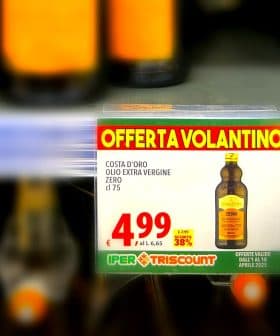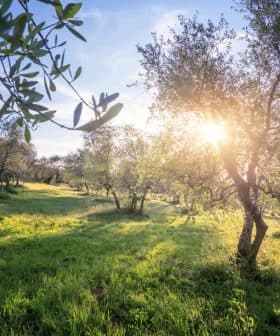Legislation Restricting Use of 'California' on Olive Oil Labels Gains Momentum

Assembly Bill 535, which would prevent the use of the word ‘California’ on olive oil labels not made from 100-percent California-grown olives, is progressing through the state legislature with bipartisan support. The bill has gained the backing of various organizations and individuals, including the Community Alliance with Family Farmers, Family Winemakers of California, and author Tom Mueller, who believe that the legislation will protect producers and consumers and ensure truth in labeling. Despite opposition from California Olive Ranch and concerns about potential impacts on businesses, the bill is expected to pass and move to the senate, with proponents arguing that it will bring the olive oil sector in line with wine labeling standards.
Assembly Bill 535, which would prohibit the use of the word ‘California’ on any olive oil label not made from 100-percent California-grown olives, continues to make its way through the state legislature.
California Olive Ranch’s Destination Series (now called Global Blend) is a threat to California agriculture and olive oil production specifically because it is undercutting honest producers.
The bill has already passed through two committees with overwhelming bipartisan majorities and is now on the full floor. As the measure steadily makes its way through the legislative process, which is likely to include amendments and compromises, it has also picked up some prominent and vocal supporters.
See Also:The very Italian problem at California Olive RanchThe Community Alliance with Family Farmers, Family Winemakers of California, Olive Oil Commission of California (OOCC), Solano County Farm Bureau and Yocha Dehe Wintun Nation have all voiced their support for the measure.
Tom Mueller, the author of the New York Times bestseller, Extra Virginity, has also tacitly supported the bill, saying that truth in labeling legislation will protect producers and consumers.
“California farmworkers, oil producers and consumers would all be well-served by strong new legislation that protects truly Californian-produced products, including olive oil, but also ensures that consumers are getting precisely what they see on the label,” he said in an interview with the California Coalition for Truth in Olive Oil Labeling (CCTOOL).
CCTOOL was formed last October to lobby in favor of AB-535, which would also apply similar restrictions for olive oils produced in certain regions of the state unless 85 percent of the olive oil (by weight) had been produced in the named region.
During a hearing of the legislature’s health committee, Cecilia Aguiar-Curry, the bill’s author, argued that the new legislation would strengthen existing laws about using the word ‘California’ on olive oil labels. However, this bill is going one step further by expanding the prohibition on the word to cover brand and company names as well.
California Olive Ranch (COR), which, among other offerings, produces a blend of California and imported extra virgin olive oils, would be the largest brand to be affected. Others, however, including Williams-Sonoma and Napa Valley Naturals, both of which source olives outside of their namesake regions, would also be impacted.
See Also:California Trade Group Rescinds Membership Agreement After BacklashMichael Fox, the CEO of California Olive Ranch, agreed that mislabeled olive oil is one of the biggest problems facing producers in the state. However, he disagreed that COR’s brand name was causing the problem.
“Our trademark is truthful,” he told Olive Oil Times. “Our operations are in California. Our ranches are in California. Our company has been called COR for 20 years.”
Fox argued that many supporters of the bill, specifically CCTOOL members, are less interested in protecting the name California and more interested in removing the word from certain products emblazoned with the company’s trademark.
CCTOOL members have always denied this claim and repeatedly said they want to protect how California is used on labels.
“What COR does internally with their branding and how it affects their sales isn’t our concern or our business,” Samantha Dorsey, a member of CCTOOL and president of McEvoy Ranch, told Olive Oil Times. “I understand that there will be implications to their business, but that’s not my concern as president of McEvoy Ranch.”
“[After 30 years,] we’re on the cusp of realizing this premium for California extra virgin olive oil and it’s really painful to go to the grocery store and see olive oil that’s masquerading as California olive oil,” she added. “After all of the work that we’ve done, it’s very disappointing and it’s hard to convince consumers to pay $30 (€25) for a bottle of olive oil.”
However, in his interview with CCTOOL, Mueller did not hold back on his criticism of the COR.
“California Olive Ranch’s Destination Series [now called Global Blend] is a threat to California agriculture and olive oil production specifically because it is undercutting honest producers,” he said.
“They built an important brand and have led people to associate COR with olive oil grown, milled, stored and sold in California and that is simply not the case with the Destination Series,” Mueller added. “Frankly, it should not have California on the bottle if it is not made in California.”
Fox disagrees with Mueller’s assessment, pointing to market research from Marketure Growth Consultants that showed 90 percent of consumers could accurately differentiate the company’s Global Blend from their 100-percent California extra virgin olive oil.
We have proposed amendments that will keep current laws in place but add new guardrails around blended products that are inspired by the strict labeling laws put forth by other countries,
The same research firm found that only 80 percent of consumers could do the same with California and Australian extra virgin olive oils produced by COR’s rival, Cobram Estate.
“We agree that truth-in-labeling legislation protects consumers, farmers, and producers. But the existing California state law (HSC 112895) is already protecting these stakeholders effectively,” Fox said. “This crisis that CCTOOL is attempting to portray is a false one. The supporters of this legislation have failed to provide one piece of data that shows consumers, farmers and producers are at risk by current labeling practices by COR or others.”
In a written statement to the legislature, the OOCC said that there has been a rise of inaccurately labeled and mislabeled extra virgin olive oil in the state, specifically regarding the provenance of the oils. The OOCC asserted that this has caused consumer confusion and led to a depression in prices.
No one from the OOCC, which is a California state-sanctioned entity, responded to requests for comment on this article.
However, proponents of AB-535, including Mueller, argue that the bill is necessary and will bring the olive oil sector in line with the wine sector.
“I think California wine has shown the way forward for this kind of legislation and olive oil needs to follow in wine’s footsteps and ensure that California labels mean that 100-percent of the olives were grown in California,” he said.
In 2000, the California state legislature passed a law prohibiting the use of protected wine appellations on labels, in which less than 75 percent of the grapes were grown in the region.
Bronco Wine, the producer of the Napa Ridge brand, which sourced most of its grapes from northern California and not from Napa County, sued the state for infringing on its copyright and the case eventually went to the state’s supreme court.
In 2005, the California Supreme Court upheld the law restricting the use of the word ‘Napa’ on bottles of wine produced from grapes grown outside of the region, despite the name being used in a trademark.
Supporters of AB-535 see this legislation as a precedent for what they are trying to do. However, Fox argues that the parallel is flawed, pointing out that the 21st Amendment gives states the right to regulate all matters related to alcohol while food is federally regulated.
“California’s wine laws are less restrictive than what AB-535 seeks to implement,” Fox said. “They do not restrict the use of the term ‘California’ in a brand name, they only restrict the use of recognized appellation names like ‘Napa’ and ‘Sonoma.’ They also include a carve-out for truthful names.”
AB-535 heads for the full floor of the legislature this week for a third reading and eventually a vote. Alan Hilburg, the founder of CCTOOL, told Olive Oil Times that he expects the bill to pass and move to the senate.
For his part, Fox expects the bill to undergo significant changes in the senate, shifting the focus away from prohibitive language toward more clear labeling standards for all olive oils sold in California.
He added that he also has been discussing the issue with Aguiar-Curry and was encouraged by their conversations. However, he admitted the two were still far from finding common ground.
“We have proposed amendments that will keep current laws in place but add new guardrails around blended products that are inspired by the strict labeling laws put forth by other countries,” he said. “Our proposals take this legislation further to assure blended products communicate to consumers that a product is a global blend.”
For her part, Aguiar-Curry continues to say that she will fight to protect the high-quality of Californian agricultural products and her intent with this bill is to do just that.
“California has the best agricultural products and the highest environmental and labor standards in the world,” she said. “Consumers look for California-grown foods because they associate California with quality.”
“Allowing companies to trick consumers into thinking they’re buying a California product because they slap ‘California’ on their package undercuts everything we’re trying to accomplish as a state,” she added. “This bill will ensure that consumers know exactly what they are buying, and it will help to support our local farmers who are producing world-class oils from olives grown here in our state.”









